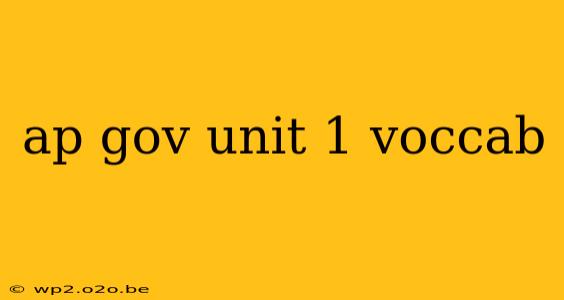Unit 1 of AP Government and Politics lays the groundwork for understanding the American political system. Mastering the key vocabulary is crucial for success in the course and on the exam. This guide provides comprehensive definitions and context for essential terms, ensuring you're well-prepared to tackle the challenges ahead.
Core Concepts & Key Terms:
1. Government: The institution through which a society makes and enforces its public policies. This encompasses all levels – federal, state, and local – and their respective functions. Understanding the different branches and their interactions is fundamental.
2. Public Policy: A course of action the government takes in response to a particular issue or problem. This includes everything from taxation and regulation to national defense and social welfare programs. Analyzing the policy-making process is a major component of AP Gov.
3. Politics: The process by which we select our governmental leaders and what policies these leaders pursue. This involves power, influence, and the struggle for control over resources and decision-making.
4. Political Efficacy: The belief that one's political participation really matters—that one's vote can actually make a difference. A strong sense of political efficacy encourages engagement, while a low sense can lead to apathy.
5. Single-Issue Groups: Groups that have a narrow interest, tend to dislike compromise, and often draw membership from people new to politics. These groups can exert significant influence, even if their membership is relatively small.
6. Policymaking System: The process by which a policy comes into being and evolves. This involves various stages, from identifying a problem to implementing and evaluating a solution. Understanding the actors involved and their interactions is crucial.
7. Policy Agenda: The issues that attract the serious attention of public officials and other people actively involved in politics at any given point in time. This agenda is constantly shifting based on various factors, including public opinion and media coverage.
8. Linkage Institutions: The channels through which people's concerns become political issues on the government's policy agenda. These include political parties, elections, interest groups, and the media. They play a vital role in connecting the public to the government.
9. Democracy: A system of selecting policymakers and of organizing government so that policy reflects citizen's preferences. Understanding the different forms of democracy (direct vs. representative) is important.
10. Majority Rule: A fundamental principle of traditional democracy in which governance reflects the preferences of the majority of voters. However, this principle is often balanced with minority rights to protect against tyranny of the majority.
11. Minority Rights: A principle of traditional democracy that guarantees rights to those who do not belong to majorities and allows that they might join majorities through persuasion and advocacy. This protects individual freedoms even within a majority-rule system.
12. Representation: The relationship between the few leaders and the many citizens. This can take many forms, from direct representation (e.g., town hall meetings) to indirect representation (e.g., electing representatives to the legislature).
13. Pluralism: A theory of government and politics emphasizing that politics is mainly a competition among groups, each one pressing for its own preferred policies. This acknowledges the role of diverse interests in shaping policy.
14. Elitism: A theory of government and politics contending that an upper-class elite holds the power and makes policy, regardless of the formal governmental organization. This contrasts with pluralist theories, emphasizing the influence of a small, powerful group.
15. Hyperpluralism: A theory of government and politics contending that groups are so strong that government is weakened. This highlights the potential for gridlock and policy instability due to competing group interests.
Expanding Your Understanding:
This vocabulary list serves as a starting point. To truly master these concepts, delve deeper into their historical context, analyze case studies, and engage in critical thinking about their application in the modern American political landscape. Consider exploring further resources such as textbooks, reputable online articles, and lectures to gain a more comprehensive understanding of these fundamental terms. Good luck with your AP Gov studies!

